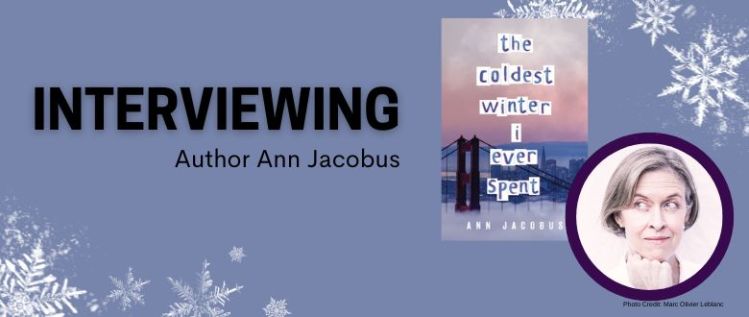The Coldest Winter I Ever Spent: An Interview with Author Ann Jacobus

Hopeful and compassionate, The Coldest Winter I Ever Spent follows eighteen-year-old Del as she discovers she cannot fully value life without accepting the realities of death. She’s in a healthier place more than a year after a suicide attempt. She’s sober, getting treatment for her depression and anxiety, and volunteering at a suicide-prevention hotline. But when her aunt receives a terminal cancer diagnosis, Del is forced to confront the demons she’s been keeping at bay.
Today author Ann Jacobus shares her inspiration for the book, her research, and her writing routines. Read on to download the free discussion guide!
Content warning: This book does involve discussions of suicidal ideation and references to suicide.

What is the most surprising thing you discovered while researching or writing the book?
When I was doing research about Death with Dignity, or “advancing the time of one’s death,” I talked at length to a very pleasant and well-informed volunteer at Compassion and Choices, a group that advocates for this. I learned at the end of the conversation that she herself had had a large brain tumor years before, one that had left her blind and incapacitated. She felt strongly about having the option for herself, to choose the time of her death and avoid a protracted and torturous end should the tumor return. She volunteered many hours to talk with individuals like myself and her words and story gave me a new view of death with dignity. I gave her a cameo appearance in the novel.
I loved making Pinterest boards of all the art that my character Fran liked and/or might have in her home or gallery, as well as more general boards for other characters.
What was your inspiration for the book?
I wanted to tell the story of losing someone you love before your eyes. When we were in our early 30’s, my best friend and boarding school roommate died seemingly quickly of pancreatic cancer. I was privileged to spend the last week of her life with her and her family helping to care for her and was with her when she died. It was my first introduction to hospice and I was deeply impressed with their gentle but matter-of-fact approach to dealing with something so weighty and problematic for the patient and their friends and family, i.e. death. They were a tremendous support to us all.
Then years later, I went through my mother’s dying in a longer and even more intimate way. She had cancer just like Fran’s and deteriorated rapidly, including losing the ability to read. Both of these experiences impacted me deeply and I wrote about them in my journals and even some fiction. But I wanted to tell a bigger story of someone going through their final phase of life. When I decided to pair a young character who was historically unstable and better yet, worked on a suicide crisis line, with a character who wants to advance the time of her death–a debate that was going on in California at the time–I had my premise.
Also, working as a suicide crisis line counselor has been a very satisfying albeit difficult job. I have long wanted to write about fictionalized versions of some of the hundreds of moving conversations I’ve had. And wanted them to inform a character’s inner journey. Having death hanging in front of you, whether by choice or not, puts things into different perspective.
What was the hardest part about writing this story? Easiest?
Hardest: Pushing Del to the edge and then past it. Also, allowing Fran to die.
Easiest: Recycling one chapter from a manuscript I wrote in the early 2000’s!
What do you hope readers will learn or discover from reading your book?
Mental health and physical health are not so different. We need to take care of ourselves to maintain both, and some people are born with genes that make them more susceptible to problems with either. Death is also something that we needn’t be so afraid of. It’s natural, we’ve all got to do it. and the process can be filled with love, laughter, healing, and forgiveness, as well as grief and loss. It shouldn’t be relegated to the shadows and only dealt with by old people. Experiencing the loss of someone significant at a young age can give one perspective and purpose beyond one’s years. Why not think about how you want everything to look at the end of your life, now?
What is your writing routine like?
I get up early and try to get to writing as soon as possible. That means usually after meditating, and with tea, but in my pajamas. It’s best if I can go about four or more hours with only one break when I might or might not get dressed. Meditation helps my creativity not to mention my mental and physical health. Afternoons are for everything else in my life, including reading and research, and for exercise, walks or swimming are great for musing on plot problems.
10 author facts:
- Oldest of six siblings, mother of four, and can be bossy.
- Danced and sang in the chorus for Little Rock, AR Community Theater productions of Annie Get Your Gun and The Unsinkable Molly Brown.
- Worked as a food server at a Bob’s Big Boy in New Mexico.
- Worked for Save the Children assistant producing sponsor–a-child ads.
- My grandfather, husband, and son were all U.S. Marines and can be bossy.
- Lived four years in the 5000-year-old Arabian Gulf port of Manama in the Kingdom of Bahrain.
- Once at an airport, I unwittingly chatted with Judy Blume and asked her if she were a dentist.
- I’m half southerner, half Yankee.
- Fan of The Office, Modern Family, Downton Abbey, Game of Thrones, Breaking Bad/Better Call Saul, The Good Wife, Stranger Things, and so many others.
- I believe that the world runs on stories.
Free Educator Resource
Download the free discussion guide for The Coldest Winter I Ever Spent to spark conversations with students. The guide can also be found on the Lerner website.
Praise for The Coldest Winter I Ever Spent
“Honestly and courageously explores sensitive topics.”—Kirkus Reviews
With intensely emotional and honest prose, Jacobus (Romancing the Dark in the City of Light) conveys Del’s inner turmoil and longing for relief from the constant pain and fear of death she believes haunt her life. . . . supportive health coordinators and mentors help Del confront her fears and find a new appreciation for life in this hopeful read.”—Publishers Weekly
“Skillfully rendered, this novel raises difficult questions about life and death. Instead of finding simple answers on the page, readers receive something better: honesty, hope and reassurance.”—Sarah Tomp, author of The Easy Part of Impossible and My Best Everything
Connect with the Author

Ann Jacobus writes children’s and YA fiction, teaches writing, and volunteers on a suicide crisis line. She’s published short fiction, essays, and poetry in anthologies, journals, and magazines, and is the author of YA thriller Romancing the Dark in the City of Light, and YA novel The Coldest Winter I Ever Spent coming in spring, 2023. San Francisco is home to her and her family.
Photo Credit: Marc Olivier Leblanc
Lerner authors and illustrators can tell you more! Find their interviews here on the Lerner blog.

Comments